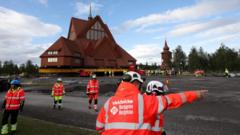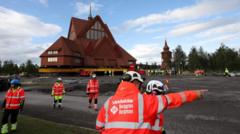A tragic missile strike in an Arab-majority town reveals the stark disparities in emergency preparedness and societal treatment within Israel.
**Divided by Conflict: Grief and Anger in Tamra Amidst Tragedy**

**Divided by Conflict: Grief and Anger in Tamra Amidst Tragedy**
An Israeli father mourns the loss of family members as societal divides are laid bare.
In a poignant display of grief and anger, 67-year-old Kasem Abu al-Hija stands amid the ruins of his family's home in Tamra, northern Israel, where an Iranian missile struck on Saturday, killing his daughter, two granddaughters, and their aunt. The tragedy highlights not only the devastating impact of ongoing conflict but also the deep-rooted societal divides within Israel.
Survivors of the attack describe a horrific scene: debris scattered across the street, and witnesses recount the chaos that ensued as rescuers searched for victims, guided by trails of blood. Despite seeking refuge in reinforced safe rooms, the missile struck directly, obliterating the space where Kasem's family had thought they would be safe. Videos emerged after the attack showing groups of Israelis celebrating the strike with chants, igniting outrage in Kasem and his community. Israel's President Isaac Herzog later condemned the footage as "appalling and disgraceful."
However, Kasem’s sorrow is complicated by anger at systemic inequalities faced by Arab communities in Israel. Tamra, a town with a predominantly Arab population, lies vulnerable to attacks yet lacks adequate public bomb shelters; it has only a fraction compared to nearby Jewish-majority towns. The disparity in emergency preparedness is stark, with 38,000 residents having only a limited number of safe spaces, as revealed in a 2018 report by Israel's State Comptroller.
Historically, Arab localities have received lower state funding, leaving many without proper shelters. While the Israeli government requires shelters in new buildings since the Gulf War, enforcement in Arab communities often falls short due to stringent planning regulations. Many homes lack adequate safe rooms, forcing residents to rely on shared community shelters, which are not always accessible during urgent situations.
The recent missile strike has intensified the feelings of neglect among Arab citizens, who constitute roughly 20% of Israel's population. A new survey shows a significant divide in public sentiment toward violence, with a majority of Arab Israelis opposing military action against Iran and expressing fear and despair amidst the ongoing violence.
Moreover, social disparities remain glaring as the Israeli government’s shifting priorities amid ongoing geopolitical strife have led to cuts in funding for Arab community development initiatives. Local officials underscore the lack of basic infrastructure and community resources, further entrenching feelings of abandonment in the region.
As Tamra grapples with the trauma of loss and ongoing threats, Kasem’s words resonate deeply with many: "The bombs do not choose between Arabs or Jews. We must end this war. We must end it now."
The profound grief experienced by the community highlights not only the immediate consequences of military conflict but also the long-term societal divide that continues to shape life in Israel.
Survivors of the attack describe a horrific scene: debris scattered across the street, and witnesses recount the chaos that ensued as rescuers searched for victims, guided by trails of blood. Despite seeking refuge in reinforced safe rooms, the missile struck directly, obliterating the space where Kasem's family had thought they would be safe. Videos emerged after the attack showing groups of Israelis celebrating the strike with chants, igniting outrage in Kasem and his community. Israel's President Isaac Herzog later condemned the footage as "appalling and disgraceful."
However, Kasem’s sorrow is complicated by anger at systemic inequalities faced by Arab communities in Israel. Tamra, a town with a predominantly Arab population, lies vulnerable to attacks yet lacks adequate public bomb shelters; it has only a fraction compared to nearby Jewish-majority towns. The disparity in emergency preparedness is stark, with 38,000 residents having only a limited number of safe spaces, as revealed in a 2018 report by Israel's State Comptroller.
Historically, Arab localities have received lower state funding, leaving many without proper shelters. While the Israeli government requires shelters in new buildings since the Gulf War, enforcement in Arab communities often falls short due to stringent planning regulations. Many homes lack adequate safe rooms, forcing residents to rely on shared community shelters, which are not always accessible during urgent situations.
The recent missile strike has intensified the feelings of neglect among Arab citizens, who constitute roughly 20% of Israel's population. A new survey shows a significant divide in public sentiment toward violence, with a majority of Arab Israelis opposing military action against Iran and expressing fear and despair amidst the ongoing violence.
Moreover, social disparities remain glaring as the Israeli government’s shifting priorities amid ongoing geopolitical strife have led to cuts in funding for Arab community development initiatives. Local officials underscore the lack of basic infrastructure and community resources, further entrenching feelings of abandonment in the region.
As Tamra grapples with the trauma of loss and ongoing threats, Kasem’s words resonate deeply with many: "The bombs do not choose between Arabs or Jews. We must end this war. We must end it now."
The profound grief experienced by the community highlights not only the immediate consequences of military conflict but also the long-term societal divide that continues to shape life in Israel.






















